Still writing all your content from scratch? Sorry, but it’s 2026, and you’re wasting time by not using an AI writing tool.
The best AI text generators can craft emails, ads, or long-form articles, accelerating and scaling your content output. Try Lindy for email follow-ups and proposals, Jasper for content writing, and Copy.ai for ad writing.
Read on to learn more about:
- My 10 favorite AI text generators
- How I tested each writing tool
- What these AI text production tools can do and how they’re changing writing workflows
- Common pitfalls to avoid
Let’s glance at our top 10 AI text generation platforms.
The 10 best AI text generators
- Lindy: Best for business communication and proposal writing
- Jasper: Great for marketing content
- Copy.ai: Quick ad copy creation
- Notion AI: Best for note drafting
- Writesonic: Good for SEO content
- Anyword: Optimized ad performance writing
- Sudowrite: Creative fiction writing assistant
- ChatGPT: Versatile conversational writing tool
- Writingmate: Strong in SEO planning
- Rytr: Budget-friendly content generator
1. Lindy: Best for business communication and proposal writing

Lindy is a no-code platform that stands out among AI text generators for its precision in business writing. You’ll build AI agents that can generate email replies, meeting summaries, or sales proposals that are on-brand and factually grounded. This makes Lindy well-suited for writing that needs a specific tone, timely delivery, and accuracy.
Core features
- Produces AI-driven email responses: Lindy’s agents will generate email replies by drawing on prior conversations and detailed information that you provide. Additionally, Lindy’s agents automatically read, categorize, and prioritize your emails for triage.
- Meeting note transcription and summary writing: Lindy agents can join virtual calls and record and transcribe conversations. They’ll then generate concise written summaries from the transcribed notes. Summaries can include key decisions, action items, and highlights. You can share these instantly via Slack or email.
- Generate proposals from structured triggers: When a deal advances in your HubSpot or Salesforce CRM, the AI Proposal Generator automatically drafts a personalized proposal. It can mention details like the client’s name, prior conversations, and value points.
Who is it for?
Lindy pairs well with business professionals who need to automate routine writing tasks without development or tech skills. These include sales reps composing cold outreach emails and managing lead follow-ups.
Pros
- No-code building interface + templates: You won’t need coding knowledge to create text-based response automations with Lindy. Pick from Lindy’s template library and build out your automation in minutes.
- HIPAA and SOC 2 compliant: We created Lindy to be out-of-the-box enterprise compliant. It protects your data with AES-256 encryption and offers fine-grained role-based permissions. Lindy can make AI agents that handle sensitive patient data for clinics securely, whether responding to emails or recording clinical notes.
Cons
- Learning curve for multi-step automations: You can create custom automations with Lindy. Just be prepared for a bit of a learning curve on the interface.
Pricing
The free plan offers up to 400 automations. After that, pricing starts at $49.99/month for up to 5,000 monthly tasks. If you need more automations, the $299.99/month plan lets you automate up to 30,000 monthly tasks.
{{templates}}
2. Jasper: Great for marketing content
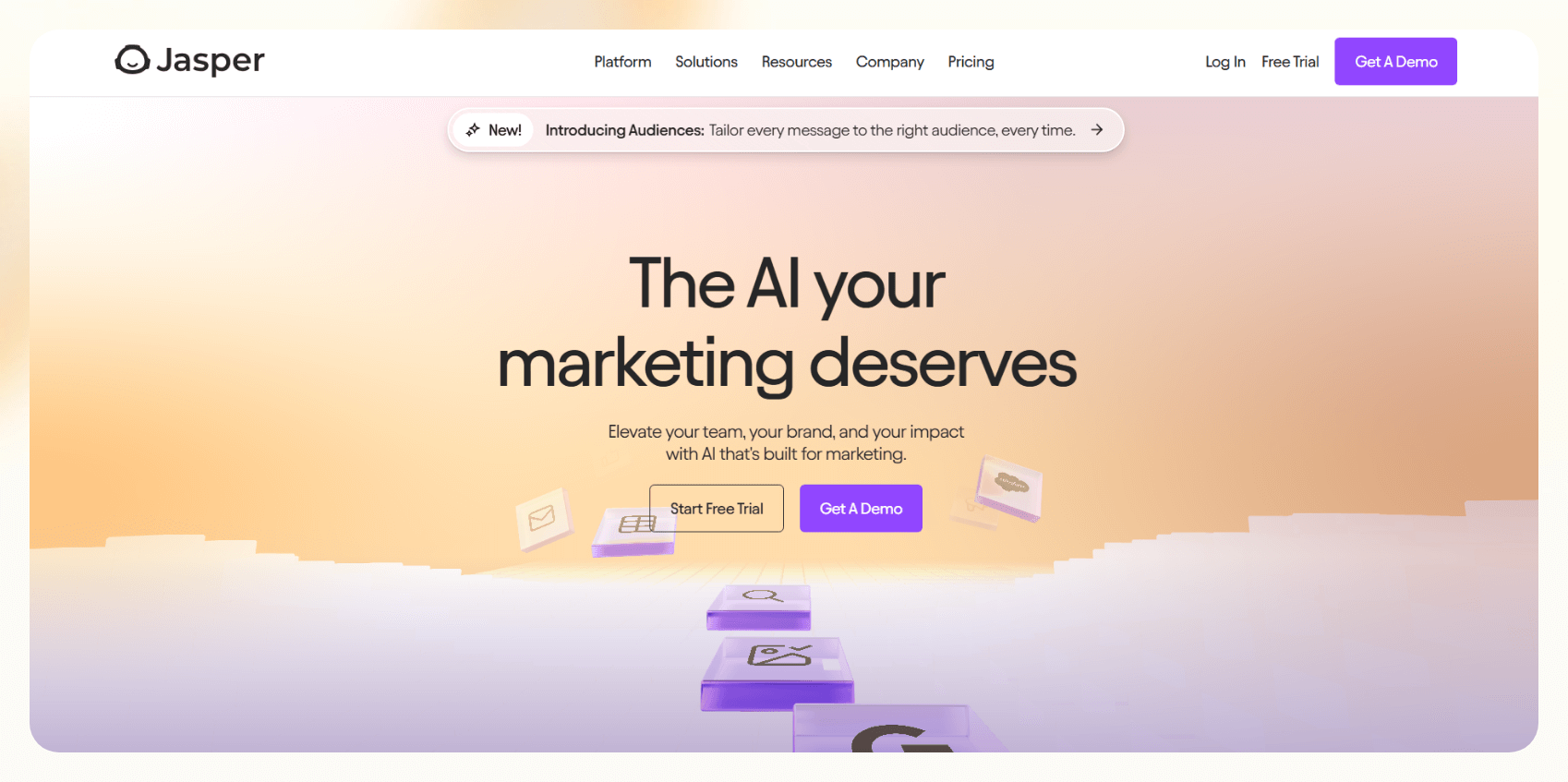
Jasper is an AI writing tool that is purpose-built for marketing teams. It uses a large language model that ingests your style guides, product sheets, audience personas, and historical campaigns. The result is copy that sounds like you and stays on-brand across channels.
Core features
- Brand voice and style guide enforcement: The system auto-flags off-brand phrases and rewrites them in line with tone, terminology, and readability targets.
- Campaign generator: Feed Jasper a brief or press release to trigger Instant Campaigns. Jasper will spin them into coordinated blog posts, ad variants, email drips, and social captions. These will maintain message harmony so you can execute campaigns across multiple channels without the usual copy-paste gymnastics.
Who is it for?
Jasper works well with teams whose content drives revenue, making it popular with SaaS, e-commerce, and marketing agencies. Its plans also meet the needs of small marketing teams and growth-stage companies.
Pros
- Deep brand control: Jasper’s Brand IQ ensures your voice stays consistent. It also reduces editing time and helps you produce top-tier content quickly.
- Campaign-level speed: Instant Campaigns auto-generate full funnel assets, letting teams pilot, test, and iterate campaigns fast, accelerating time-to-market.
Cons
- Marketing-centric: Generating product or technical documentation or email response may require extra prompt configuration.
- Seat-based pricing: Each additional Pro user costs extra. If your team grows, the total price may exceed unlimited-seat competitors.
Pricing
For $49/month per seat, Jasper gives you access to its chat and SEO functionalities and its browser extension for quick content generation. The $69/month per seat plan supports up to 3 campaigns. It also includes one of the best AI text-to-image generators.
3. Copy.ai: Quick ad copy creation
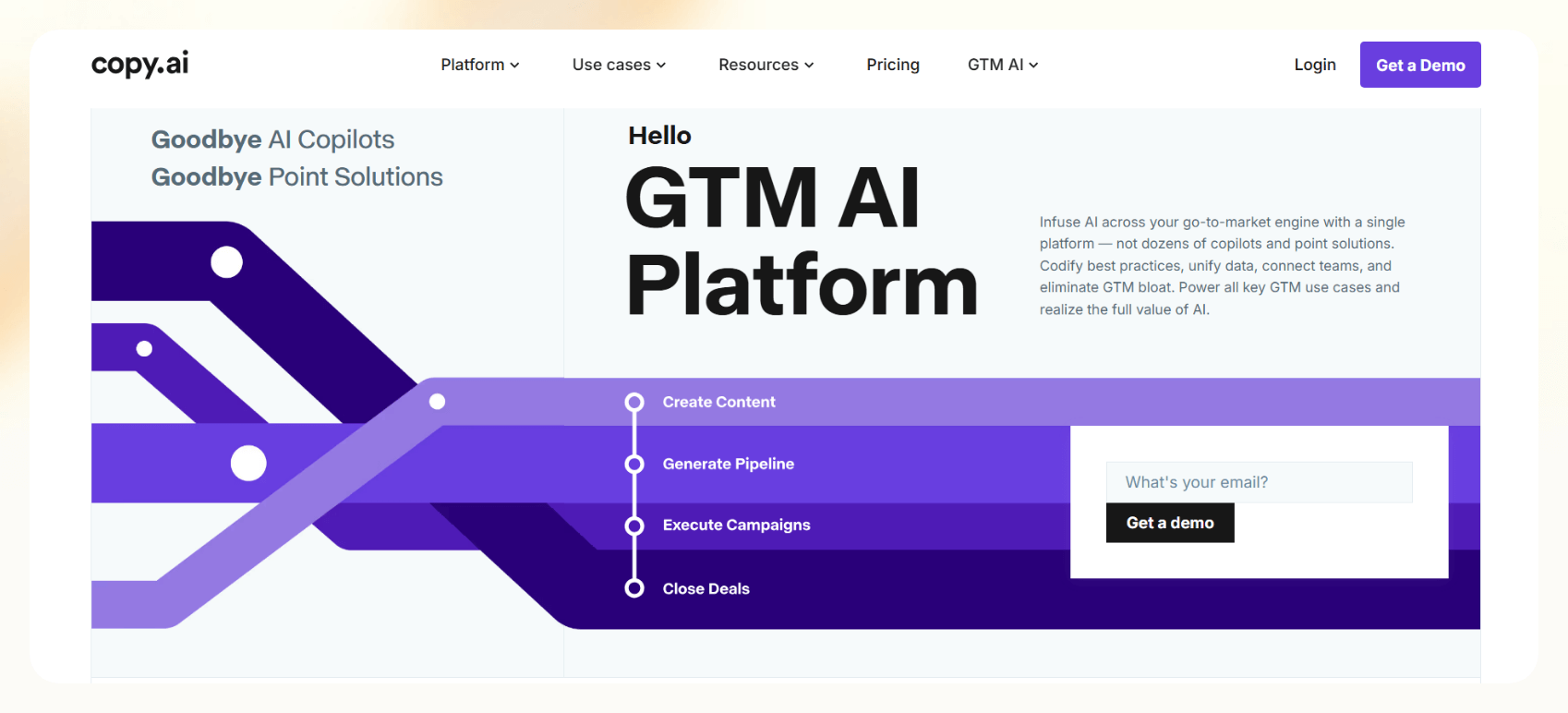
Copy.ai is an AI writing tool for crafting conversion-oriented ad copy for platforms Facebook, Google, and TikTok. The platform lets you keep ad lines on-brand to target the right buyer pain points.
Core features
- Generates ad copy via templates: You’ll get access to a library of over 45 pre-built patterns for search, social, native, and programmatic ads. These allow you to auto-populate with your product benefits and proof points so you can generate ads quickly.
- Brand voice and infobase context layer: Upload past top-performing ads, landing pages, and tone guidelines once. Copy.ai will extract the key facts and apply them to every new content piece.
- Workflow builder: The platform features a no-code workflow builder and procedural actions. For instance, you can scrape a URL, summarize it, extract pain points, and draft a set of ads.
Who is it for?
Copy.ai is for teams that create ads across several different channels. It serves a wide range of industries, such as e-commerce and SaaS.
Pros
- Rapid ad generation: The instant-ad engine turns a single product description into 10–20 ready-to-upload variations, complete with channel-safe lengths and emojis.
- End-to-end no-code automation: Workflows plus Agentic Actions mean you can scrape competitor messaging at 8 a.m., auto-draft counter-ads, and publish them on a social channel by 9 a.m.
Cons
- Not ideal for deep editorial: Copy.ai excels at bite-sized, persuasive ad copy. It’s not an AI writing tool for long-form pieces.
- Learning curve for power users: Building sophisticated, multistep automations demands process mapping and trial-and-error, which can be lengthy.
Pricing
Copy.ai’s first plan costs $49/month and gives you unlimited words in its chat features. The Advanced Plan, at $249/month, lets you have over 15 sales workflows and allows for up to 5 seats.
4. Notion AI: Best for note drafting
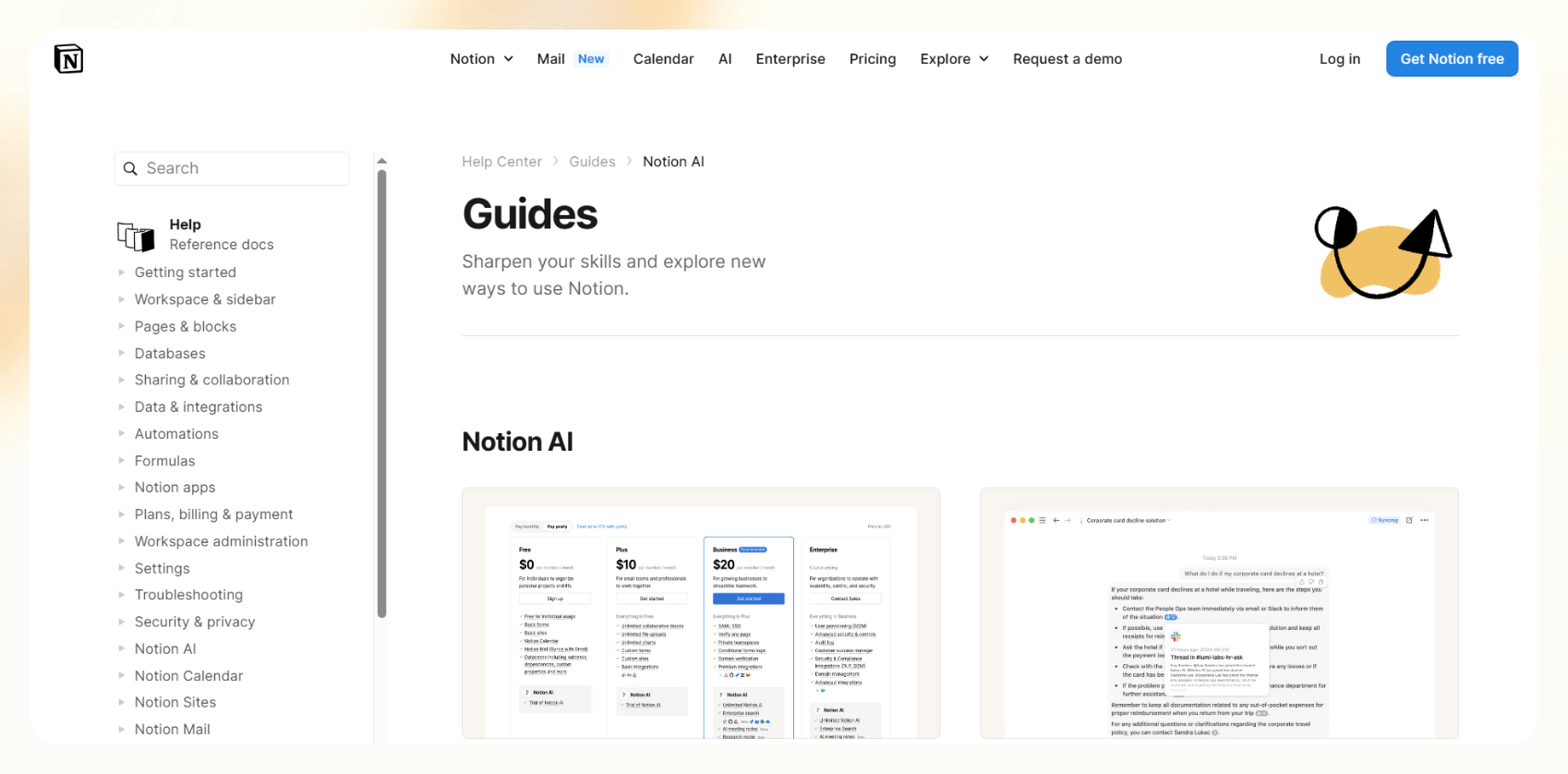
Notion AI is an AI writing and search tool directly available inside your Notion workspace. It lets you draft and summarize notes without clicking an extension or opening up another AI text generator.
Core features
- Instant note and doc generation: Wherever you can type in Notion, its AI writing tool is there to help. It can outline a brand-new page, rewrite selected text, shorten, simplify, or change voice — all while respecting markdown blocks and database properties.
- AI meeting notes: Add the AI Meeting Notes block to any calendar event. The platform can transcribe live calls and separate the discussion from the transcript. It will then produce structured summaries with decisions and tagged action items.
- AI autofill for databases: Create an AI Autofill property, and Notion will automatically populate summaries, sentiment scores, or next steps for every row. This also lets you populate fresh insights into dashboards to keep your team up to speed.
Who is it for?
Notion AI works for anyone who needs to capture and distill ideas. This includes product managers, engineering and design teams, and marketing professionals. It’s also ideal for agencies and consultancies that lean on meeting-note transcriptions and database autofill.
Pros
- Smooth, native experience: Because AI lives inside your Notion account, there’s zero copy-paste overhead. Drafts, edits, and summaries all feature the same page structure. That native context lets the AI produce higher-quality notes than standalone chatbots that rely on pasted text.
- Powerful knowledge retrieval: Finding data is as simple as typing a question into the prompt window. Notion AI returns cited answers that essentially relegate “Ctrl + F” to the dustbin of history.
Cons
- Locked to the Notion ecosystem: Notion AI only works inside the Notion workspace — it can’t be used as a writing assistant in tools like Gmail, Google Docs, or Word. While powerful for note-taking and in-app content creation, it lacks the portability and versatility of AI writing tools like Lindy, ChatGPT, and Jasper.
- Text-centric: Deeper multimedia capabilities like video editing and image generation are limited.
Pricing
Pricing starts at $12/month per user, but it only comes with a trial of Notion AI. The $24/month per-user plan offers Slack, GitHub, and Google Drive integrations.
5. Writesonic: Good for SEO content
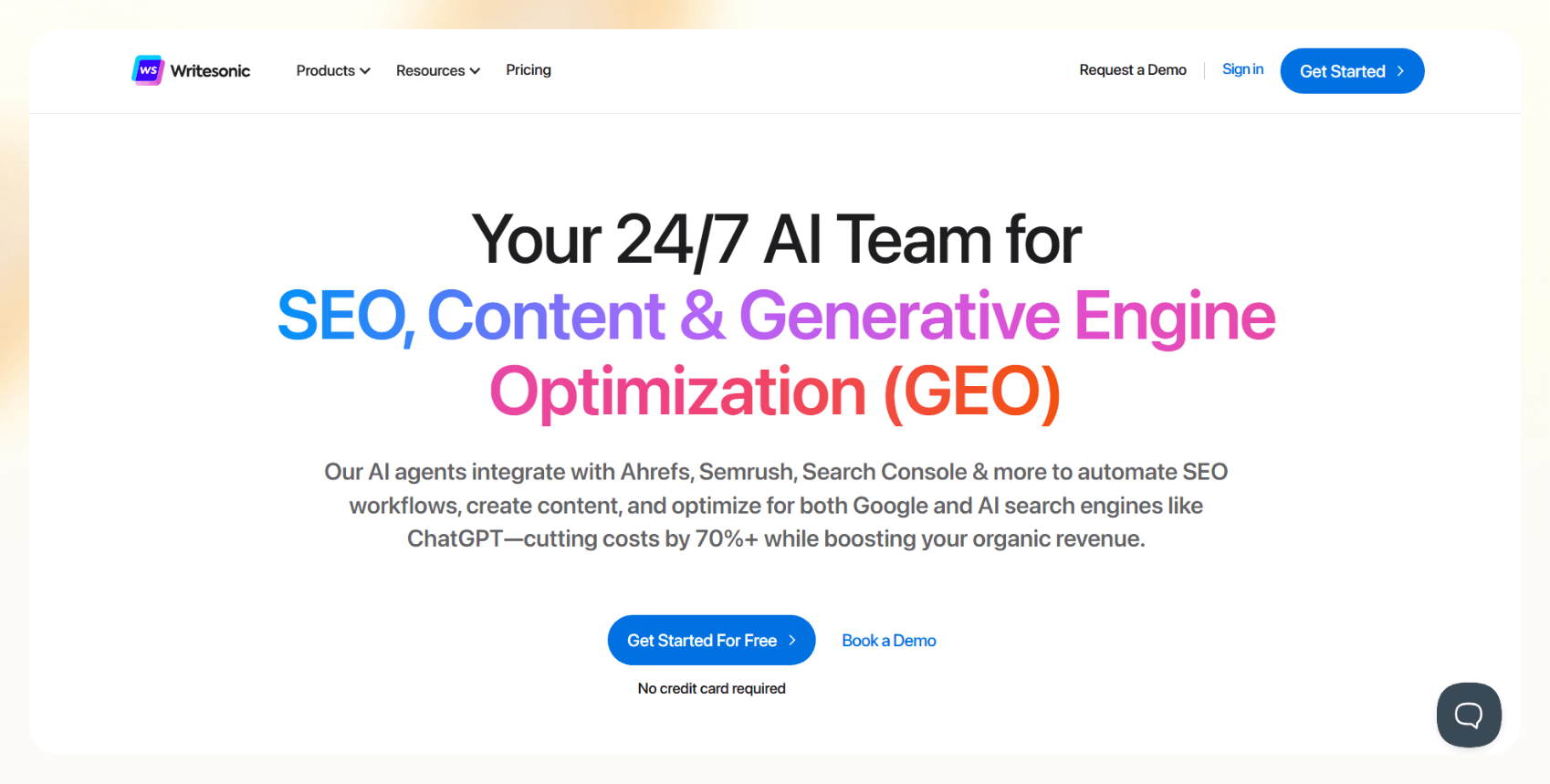
Writesonic is an AI writing tool that lets you create agents that specialize in writing long-form content. You can create agents without coding to generate everything from single-blog tasks to enterprise-scale content.
Core features
- AI article writer and brand voice cloning: Feed the writer a headline, reference URLs, and command a preferred tone, and it will generate a full draft.
- Article outline generation: Writesonic will create H2s, H3s, and H4s, bullet-point lists, FAQs, and meta description.
Who is it for?
Writesonic is built for SEO content teams that need to publish articles at speed and scale. It’s also useful for e-commerce businesses that need to create content for search engine optimization. It also complements SEO platforms like Ahrefs and SEMrush for content strategists.
Pros
- Unified SEO workflow automation: Writesonic centralizes the entire SEO process, from keyword research to SERP-optimized drafts, content outlines, and on-page recommendations, within a single dashboard.
- Reduced manual effort in optimization: The platform minimizes the need for manual input in content planning and optimization. Its automation capabilities streamline tedious tasks, making SEO execution faster and more productive.
Cons
- Steep learning curve: The sheer volume of templates, agents, and metrics can overwhelm newcomers. This means that you’ll need to schedule significant onboard time to learn the platform.
Pricing
Get started for only $20/month and create up to 10 agents that can publish no more than 5 articles per month. The $49/month version lets you build up to 100 agents and publish no more than 15 monthly articles.
6. Anyword: Optimized ad performance writing

Anyword creates marketing copy across multiple platforms. It combines data, creative writing capabilities, and performance analytics, allowing marketers to test multiple variations and select options most likely to drive engagement.
Core features
- Predictive performance score: Anyword’s flagship feature is its predictive performance score. It assigns a numerical rating to every piece of generated copy, helping you compare variants and select the one most likely to convert.
- Score panel for audience and messaging insights: Provides demographic insights, such as age and gender distributions and emotional scoring, highlighting which audience segments are most likely to engage with your content.
Who is it for?
The platform offers plans for freelance marketers and enterprise marketing teams across e-commerce, SaaS, financial services, and direct-to-consumer brands.
Pros
- Data-backed confidence, not guesswork: The Predictive Performance Score lets teams see the statistically strongest headline, CTA, or subject line before launch.
- Tailored messaging for every audience: Generates multiple copy variations optimized for different customer personas and channels
Cons
- Steep price curve for premium features: Real-time scoring, web-copy personalization, and custom AI models are only available on the $99 or $499 tiers. This may be out of reach for freelancers or teams on a budget.
Pricing
For $49/month, you’ll get unlimited copy generation and 50 performance predictions. The $99/month version gets you 100 performance predictions and allows for up to 3 users.
7. Sudowrite: Creative fiction writing assistant
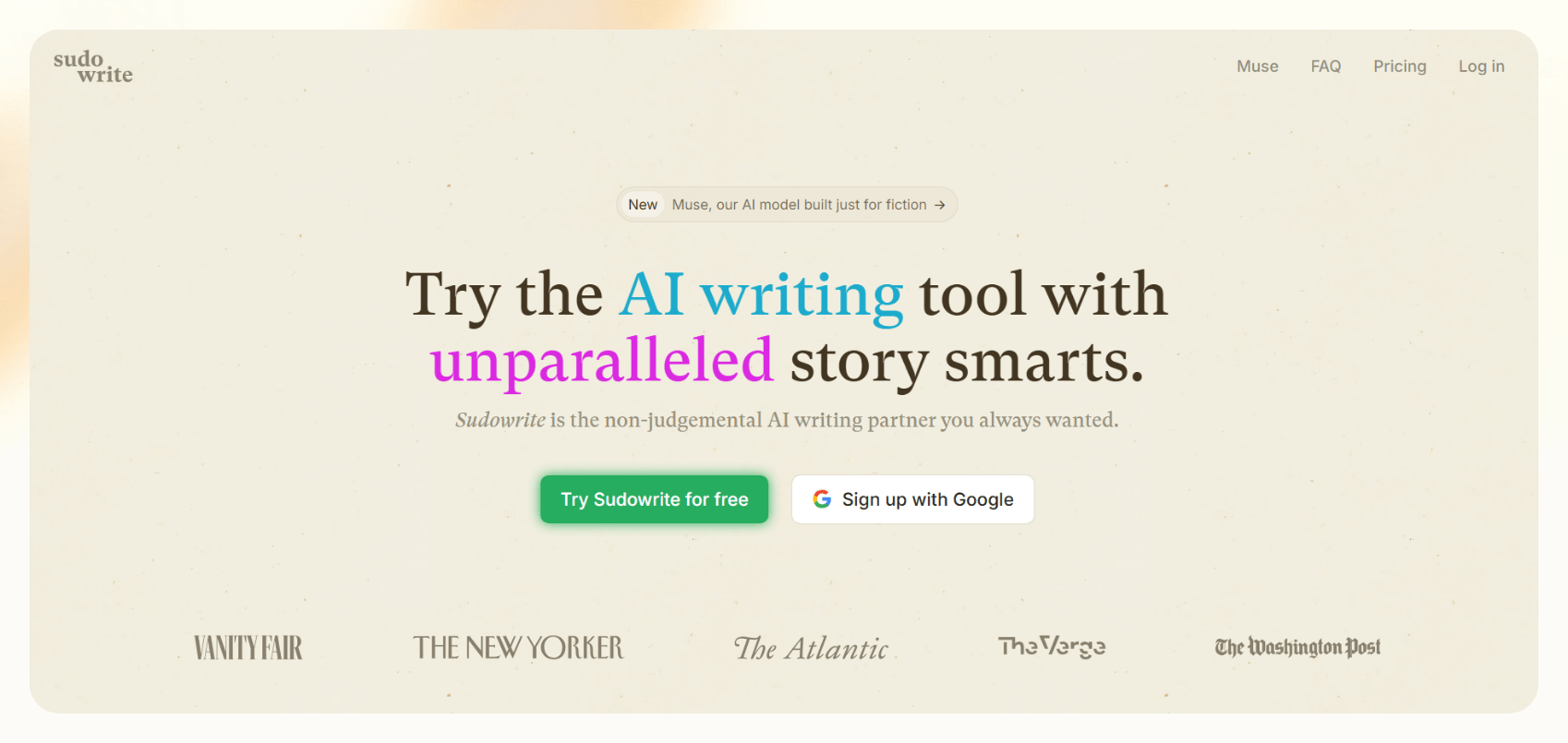
Sudowrite is an AI co-author built for narrative writers. Its LLM, Muse, is trained on narrative prose, so its suggestions have emotional nuance geared toward prose writers instead of marketers.
Core features
- Story Bible: Upload character notes or let Muse ask guiding questions to auto-build a living “Story Bible,” which outlines parts of your story.
- First-Draft Engine: Generate scene cards and even draft 500-1,000-word chapters that match your uploaded voice sample.
Who is it for?
The platform is built for fiction authors, screenwriters, game narrative designers, and creative writing students. It also serves individual creators and small teams that need consistent narrative output and idea flow.
Pros
- End-to-end creative workflow: Sudowrite provides tools for constructing every part of your narrative. This includes the Brainstorm function to get ideas off the ground and the Canvas function for building structure.
- Fiction-first AI that matches your voice: Sudowrite’s proprietary Muse model is trained explicitly for fiction — it can generate prose that aligns with your unique narrative voice.
Cons
- Limited collaboration features: Sudowrite lacks multi-user or commenting tools for teams. That makes it less ideal for collaborative writing environments or editorial workflows requiring version tracking and feedback.
Pricing
Get started for $19/month and get 225,000 credits, about enough for 30,000 words. The $29/month version provides 1 million credits, typically enough for over 100,000 words.
8. ChatGPT: Versatile conversational writing tool
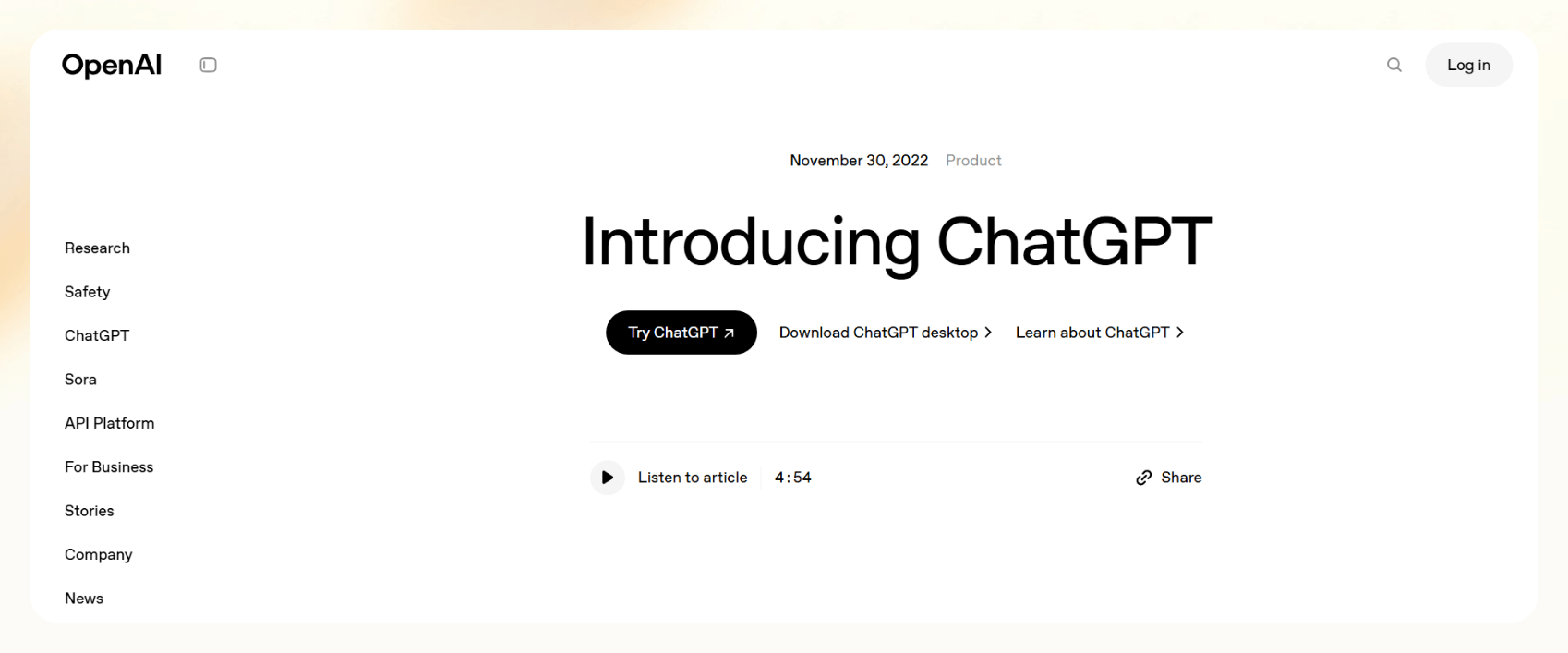
Open AI’s ChatGPT — the OG of generative AI — is a multimodal AI that writes, codes, brainstorms, analyzes data. You can prompt it with voice, images, or text.
Core features
- Context-aware prompting and memory: ChatGPT retains context within conversations, allowing for multi-turn interactions and deeply nuanced content generation.
- Multimodal capabilities: ChatGPT's GPT-4o model can interact with you through text, voice, and images.
Who is it for?
ChatGPT can meet the needs of nearly any organization that produces written content. It can draft, edit, and proofread articles, summarize documents, and more.
Pros
- Wide content format support: The platform supports social posts, ad headlines, and long-form articles. This ability to suit various content needs makes ChatGPT one of the best AI text generators available.
- Context-aware content refinement: ChatGPT remembers previous prompts within a session, allowing it to maintain tone, style, and intent across revisions.
Cons
- May hallucinate or misinform: ChatGPT can occasionally generate inaccurate or fictional information, especially when asked about niche or time-sensitive topics. You should always fact-check outputs, especially for business, legal, or health-related use cases.
Pricing
Pricing starts at $20/month. It gives you limited access to multiple reasoning models like ChatGPT o3 for deep thinking and ChatGPT-4.1 for coding tasks. The $200/month plan provides extended deep research capabilities and a preview of Codex, GPT’s coding agent.
9. Writingmate: Strong in SEO planning
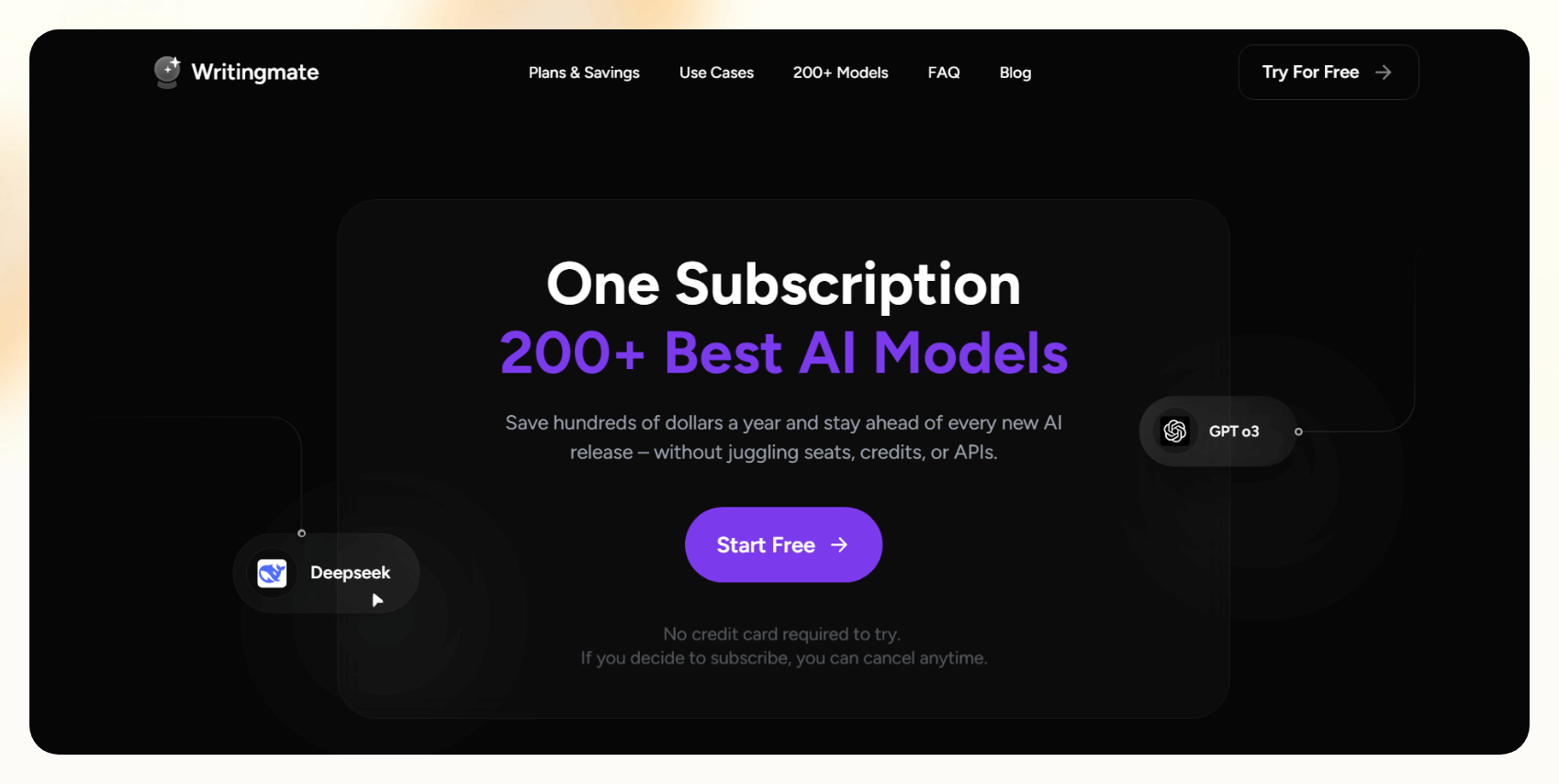
Writingmate is an AI writing tool for SEO-focused content creation. It can generate keyword-optimized blog posts, product descriptions, and landing page copy that align with current search engine algorithms.
Core features
- Integrated keyword research and planning: The platform includes built-in keyword discovery tools that help you identify high-potential keywords and long-tail phrases.
- Topic prioritization engine: It also ranks topics by difficulty and search volume, enabling smarter editorial decisions before the writing even starts.
Who is it for?
Writingmate is ideal for content marketers, SEO agencies, and in-house marketing teams. It serves freelancers, small-to-midsize businesses, and enterprise-level content operations that publish at volume and compete in crowded search spaces.
Pros
- All-in-one SEO and writing workflow: Writingmate covers every stage of SEO content production — from keyword research to competitor benchmarking to final draft creation. It removes the need for multiple tools, saving time and reducing tech stack complexity.
- Several productivity tools: Beyond text generation, Writingmate offers a suite of productivity features such as web search and file interaction (including PDFs and images).
Cons
- Content can feel robotic: If you lean too heavily on Writingmate’s keyword prompts and templates, the content can occasionally come off as stiff or keyword-stuffed. You’ll still need to apply a human touch to ensure content flows naturally and meets brand standards.
Pricing
Get the Writingmate for $14.99/month and access over 50 LLMs, such as ChatGPT 4o and Claude 3.0 and 3.5. The $29.99/month plan provides 100 daily messages and the ability to “chat” with documents that you’ve uploaded.
10. Rytr: Budget-friendly content generator

Rytr is an affordable AI writing assistant built for quick, straightforward content generation across various formats. It can adapt to different tones, industries, and audiences without the complexity or cost of more advanced platforms.
Core features
- Use-case templates: Rytr offers over 40 writing templates covering business pitches, testimonials, and meta descriptions. Choose a use case, fill in a short prompt, and generate results instantly.
- Multilingual support with tone customization: The platform supports over 30 languages and 20+ tones, and adapts accordingly to every project.
Who is it for?
The platform can meet the needs of freelancers, solopreneurs, startups, and small businesses. It serves users in industries like e-commerce, digital marketing, real estate, and consumer services.
Pros
- Affordable and simple: Rytr offers a low price point, making AI content generation accessible for users who can’t justify higher-cost AI text generators. Its template-based interface is beginner-friendly and can be set up in a snap.
- Versatile content generation: Rytr is suitable for various applications, from crafting compelling marketing copy to drafting detailed reports.
Cons
- Limited advanced functionality: Rytr lacks the sophistication of premium AI writing tools. It doesn’t offer advanced features like SEO optimization, plagiarism detection, or content planning.
Pricing
Start using Rytr for $9/month and generate up to 100,000 characters. The $29/month plan offers 100 monthly plagiarism scans and an unlimited number of characters.
Top 5 AI text generators: At a glance
{{cta}}
How I tested the best AI text generators
To find the best AI text generator for scaling high-quality content in 2026, I tested the free versions of top writing tools. I evaluated their ability to produce human-like, on-brand content across blog intros, emails, and ad copy. Here’s what I looked for:
- Human-sounding context-aware content: Writing that flows naturally, adapts to tone, and avoids robotic phrasing.
- Multi-format flexibility: The ability to generate coherent and effective outputs across blog intros, follow-up emails, and ads.
- Brand voice consistency: Content that maintains tone and style across use cases and mirrors the target audience’s expectations.
These tests showed me that the best AI text generators delivered fluent, brand-aligned content across formats. These platforms adapted, persuaded, and performed with real-world versatility.
What can an AI text generator do?
AI text generators can produce on-brand content for articles, emails, and ads. They can help you overcome writer’s block, meet tight deadlines, and generate new ideas. The best AI text generators can also improve tone and provide editing feedback while producing more content at scale.
How generative AI is changing writing workflows
Generative AI rewires writing workflows by generating outlines, drafts, and sections from a simple prompt or template. It also optimizes workflows by allowing editors to refine tone and facts rapidly. AI writing tools achieve this by auto-suggesting grammatical and pertinent facts, slashing editing time.
Common pitfalls of AI writing tools
AI text generators are far from flawless — here are a few issues to be aware of:
- Bland or generic output that misses user intent
- Occasional hallucinations and factual inaccuracies
- Overuse of clichés, awkward phrasing, cringy tropes
- Risk of unoriginal or plagiarized content
- Limited creativity compared to human writers
Editing every piece of content generated by AI writing tools is crucial. You can ensure your content is plagiarism-free by using an embedded plagiarism scanning tool like Grammarly.
Frequently asked questions
What is the best AI text generator in 2026?
Lindy, Jasper, and ChatGPT are the best. Lindy is ideal for response writing, Jasper for writing marketing copy, and ChatGPT for conversational content and long-form drafts.
Which AI tool is best for blog content?
Writesonic’s Article Writer 5.0 is good for blogs. Feed a headline and reference links; it generates SEO-layered outlines, H2–H4 headings, FAQs, and meta tags, then scores readability against SurferSEO.
What is the best free AI text-to-video generator?
The best free AI text-to-video generator in 2026 is Pictory. It converts scripts or blog posts into engaging videos using stock footage, voiceover, and AI editing. It’s ideal for marketers and content creators, with a free tier that offers limited exports.
Automate more business processes with Lindy AI text generation
Need one of the best AI text generators to automatically execute written work? Choose Lindy, a no-code platform that lets you create customizable AI agents for drafting responses, summaries, and more. Here’s what Lindy offers:
- No-code ease: Trigger writing automations in minutes with drag-and-drop workflows and ready-made templates — no programming required.
- Tailored voice, zero busywork: Feed Lindy sources and company facts, and its agent can draft follow-up emails, proposals, and social media posts while you focus on strategy.
- Budget-friendly: Lindy can automate up to 400 tasks a month for free, and up to 5,000 tasks on Pro — a value that beats pricier competitors without skimping on quality.




















.avif)
.avif)

.png)
%20(1).png)


.png)